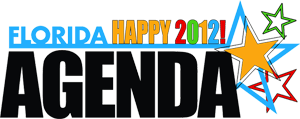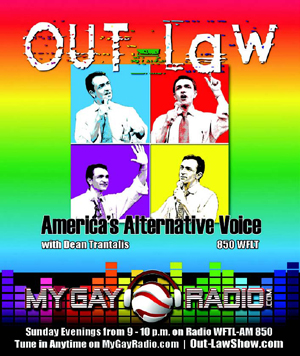
By BOB KECSKEMETY
Fred Frejes, local historian and professor at Florida Atlantic University, is preparing to chronicle the history of Greater Fort Lauderdale’s LGBT community’s history. He is looking for the community to help him with this project.
“Part of it has to do with that fact that I live here,” said Frejes when asked why he was interested in writing a book about our local history. “Fort Lauderdale is a very important and an almost unique community. The lesbian and gay community in Greater Fort Lauderdale is a resort community – tourist community – and resorts are something that are really becoming the hallmark of our culture. It’s a gay community built around tourism.
“The other thing is that it’s by the beach and physically it’s different from most other gay communities. It’s close to the beach and people move down here because of that.
“Also, this is a community where a lot of lesbian and gays are moving to. This is like the second-to-last chapter of the Stonewall Riots story. The ideas of [the Stonewall] generation that was there then are now calling South Florida home.”
Frejes was born in Illinois and went to Georgetown University, Michigan State University and the University of Illinois. He received his PhD in Communications Research at the University of Illinois and taught at Wayne State University in Detroit for four years and has been a visiting professor at the University of Wisconsin, the University of Iowa and the University of Illinois.
In 1986, Frejes moved to South Florida and arrived at Florida Atlantic University in Boca Raton in the Communications and Multi-Media Studies Department, and became the director of the graduate program. Three years ago, Frejes stepped down as Director of the University’s Honors Program after fifteen years.
Frejes’ research started out mostly involving international communications with a particular focus on Latin America. However, Frejes, who was married to a woman for seven years and came out at the age of 30, moved to South Florida and became more interested in LGBT history.
Frejes has published three books, but his third book is the first one on LGBT history. The book “Gay Rights and Moral Panic” follows the Anita Bryant anti-gay campaign starting in Miami and moving across the country to California.
“In the 1990s, there was a real upsurge in gay history,” explained Frejes. “A lot of people started writing gay history, books were being published by academics and they always mentioned the Anita Bryant campaign but never really talked about what it was like. In fact, there was not real official history – no serious history of the Anita Bryant campaign – so I figured this book was going to fill the void and I wrote it. It got very good reviews in the scholarly journals and the historic journals. The historic journals recognized that this book needed to be written because there was no solid account of the Anita Bryan campaign or the campaigns that came afterwards in Wichita, St. Paul, Eugene and California.”
In 1986, Frejes became politically active joining Rand Hoch and others in the formation of the Atlantic Coast Democratic Club; became a member of the Dolphin Democratic Club, and sat on their board at one point in the 1980s, “When only five of us would show up at the meetings,” he added.
For his newest project and book, which Frejes calls “The Broward County LGBT Community History Project,” he is looking for volunteers to help with the oral histories and project research. “Since this is associated with a university, there are certain research protocols that we must follow in regards to confidentiality, where we store the data, and we will try to work all that out so that we comply with all the federal requirements,” explained Frejes.
Frejes explained that first he needs to develop a chronology and put together a timeline of what happened when and where which means going through public records and getting all the relevant articles written buring 1970s and 1980s from the Sun Sentinel and the then-Fort Lauderdale News. Frejes is also looking for individuals who may be interested in doing individual topics.
“A volunteer might be really interested in something like the bars and clubs in the 1980s – which were the big bars and how did they change. Or perhaps they would like to do something about AIDS and the history of the AIDS organizations and the community response to the disease.”
“I found that the Ft. Lauderdale community has moved through a number of different phases. I think the first phase, going back to the 1970s and early ‘80s, was all about playing. That’s what really made this place what it was. Then in the ‘80s, it became about AIDS. AIDS became so much of our experience. Then came the AIDS organizations and the fundraisers. Then in the ‘90s it became about political activism. That’s when we passed the gay rights laws here in Ft. Lauderdale, Palm Beach and Miami. Now, it’s about mainstreaming and becoming a community. That’s the route we will follow.”
Beyond that, Frejes will be setting up training for volunteers to do oral histories of individuals. He will be looking for people to go out and find the people who have a story to tell. These volunteers will be trained in proper protocol required by the university.
”It’s not rocket science,” said Frejes, “but we need to keep some standards and organization.”
Frejes said that the Stonewall National Library and Archives has been an important resource – one that few LGBT communities have. He said that they have records of organizations going back to the ‘70s and has copies of The Weekly News (TWN) that go back to its beginning. Frejes said they are not running the project but he has already been working closely with them.
Frejes will also occasionally be holding what he calls “Community Memory Forums.” These will be community meetings where people will come and talk about a topic such as AIDS in the ‘80s. He said that when people sit around and talk about “the old days,” new facts seem to pop up as people’s memories are jarred. He himself will conduct these forums so they will have more of a sense of history instead of people just throwing out their memories.
“There’s a methodology that’s been developed. I would also like to put these things in terms of larger events that were happening so we see the larger picture.”
What Frejes doesn’t want is for the final research to be a cheerleader for the LGBT community. He said that he has an obligation to write what he sees and what he finds through the research.
“If you really want an honest picture, you have to consider everything and everything is important. For example, there is a really big escort culture here,” he said. “Now, I don’t judge that as good or bad or whatever. It is what it is.”
Frejes hopes to hold an official meeting in late October or early November for people and volunteers who are interested in becoming part of the project. At that point, the group will decide in what direction they want to go. “I have an idea of what it should look like and how it should proceed, but I want to make sure people put out their ideas.
Frejes envisions that the research for the project will take three to five years. He said that there are many history projects that don’t end, but he plans to take the five years of information that has been gathered for the book. The book itself will take about two years to write.
To get the latest information on the project, to volunteer and to share your memories and ideas or just keep up-to-date on the project, please search Facebook and LIKE “Broward County LGBT Community History Project.”



